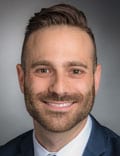When fellowship opportunities didn’t offer a path that reflected the vision Daniel A. Roberts, MD, had for his career in medicine, he forged his own.
The pressure to pursue an academic medicine career is high in oncology, but the need for well-trained community-based clinicians is also great, Roberts told Medscape Medical News.
He wanted a path that would allow for both.

Dr Daniel Roberts
“I think a lot of people, in reality, desire to do clinical medicine and not necessarily be a pure academic. Some who are going through the fellowship process and training want a more clinical path but there’s not really a path for being hooked up in an academic environment without necessarily writing grants and pursuing a traditional research career,” he explained. Sometimes, he added, that academic track is the only way to market yourself — to move up, to get a fellowship, to get a job, noting that “the currency is publication.”
“It was obvious to me that there was a void…so I did my own thing,” he said. He emphasized that the concept isn’t new — it’s just not well defined and there is a lack of formalized training.
With “great support” from the program directors at Beth Israel Deaconess Medical Center in Boston where he completed both his internship and fellowship, he helped develop a hybrid academic and community hematology-oncology training model.
He spent the majority of his fellowship at Beth Israel Deaconess Hospital-Needham, the center’s flagship community site.
He was the first at the center to “do this formal-ish track,” but since then, a handful of others have followed in his footsteps. Now, Roberts and his colleagues are working to publish a cogent training plan for an academic-community hybrid track.
“A lot of places with fewer resources probably need this,” he said. “Some are probably already doing this, but maybe not formally.”
Community sites could really benefit from having “people who are good clinically, but who also have an academic edge, if you will,” he said, adding: “This area is ripe for formalization. It’s ripe for growth.”
“The overall oncology care infrastructure needs it,” he explained. “The more integrated a cancer center is with an academic hub, the better.”
Roberts shares more about his fellowship experience and his thoughts on the hybrid clinical-academic training model in a recent column published last month in the Journal of Clinical Oncology. He described how he was “searching for an alternate path…intent on pursuing a career in community-based hematology,” but came up short.
“I genuinely did not know where I fit in,” he writes, explaining that he “wanted to see patients and also wanted to maintain a connection to an academic center,” but saw little opportunity for that.
The hybrid training model provided a career option other than those that were readily available, such as private practice where most physicians see too many patients each day to allow time for research; a physician-scientist career that allows little time for clinical practice; a clinician-educator role — and the pressure to publish that comes with it; and a clinical trialist role requiring sub-specialization, usually at an academic center.
Instead, his training — which included engaging in quality improvement work through the American Society of Clinical Oncology Quality Improvement Practice Initiative and other relevant projects — led to his current role at the Dana-Farber network in Boston. There, he practices as a subspecialist in genitourinary oncology for one day each week in an urban setting, but spends most of his clinical time practicing both genitourinary oncology and general hematology and oncology at a satellite cancer center serving suburban and rural populations.
Instead of peer-reviewed publications, the “currency” in community-based practice is “field experiences — not just clinical but also cross-disciplinary teamwork projects that involve research, QI, business and operations, community engagement, and health policy,” he writes. “At this point in my career, I could not be happier.”
His advice to others who want to think outside the box when it comes to fellowship training?
“You have to do what you love,” he said. “Part of the reason why I did this…I have no academic title, no expectation to write papers. I get paid to do clinical work, and I did this because I love it.
“I feel passionate about this model, I feel passionate about this sort of cancer care delivery, so to folks thinking like this about where they fit in in oncology or medicine overall: Do what you love! That’s number one. Number two, for those asking if this can work for them — yes, you can be in academic and the community and coexist. The time for this is now!”
Roberts acknowledges that his take sounds idealistic. He was fortunate to have undergone his training at a large, well-known cancer center where he had the support of open-minded fellowship directors, and Dana-Farber embraced the hybrid model. But he believes the approach is scalable and flexible.
“I know that others have limited resources, but I would argue that this sort of model is here to stay; there are ways to do community cancer care and academics together,” he said. “Medicine is a team sport — we can’t do this siloed anymore.”
That goes not just for cancer care, but for all highly specialized care in complex systems, he added.
“We have to work together. The people downtown need to work with people in the community and the people in academics need to work with satellites — and vice versa,” he said. “We have to be open to collaboration.”
Roberts has disclosed no relevant financial relationships.
J Clin Oncol. Published online September 17, 2021. Full text
For more from Medscape Oncology, join us on Twitter and Facebook
Source: Read Full Article
